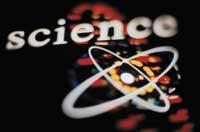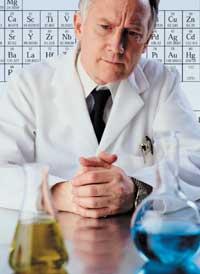What do you think of science?

The intention of this Foundation has been to know the opinion of society about science. The Eurobarometer conducted a similar survey in 2001, but then they took into account all States of the European Union and measured the level of knowledge of people on scientific issues.
However, in the questionnaire carried out in Spain they have only wanted to collect the perception of science. To do this, 3,088 people over 15 have asked a series of questions. In addition, the autonomous communities have taken into account in order to establish comparisons between them. Other classifications depend on age, gender and level of studies, as well as Internet usage.
Science is interesting, but...
The level of scientific knowledge of the Spanish population is relatively low. However, most respondents respond that they are interested in scientific and technological issues, especially those related to medicine and health. On a scale of 0 to 10, 7.02 points have been awarded to these topics. Those of Environment and Ecology obtain 6.64 points and those of Science and Discovery 5.72. All these topics have received a score higher than sport (5.71) and travel and tourism (5.33). Amazing! But the truth?

The difference between people's responses and real trends stands out in consumption. In fact, the most widely used media for information collection is television, and the programs they see most are news (81.3), movies (71.1) and sports (44.3). Nature and animal documentaries appear further behind (39.5) and fewer still choose programs on health (25.1) and science and technology (24.2). Therefore, even though when asked they answer that scientific topics are interesting, people really prefer other content when watching television.
Something similar happens on the radio and in the written press, but in them the difference between the alleged interest and the information they receive is even greater. Only 5.9% of the population listens to science and technology programs and only 3.6% read scientific journals. As for books, the picture seems better, as 8% read science books, but some of these readers are still studying. In addition, in general, there are very few regular readers: 42% of respondents acknowledge that they do not read books.
On the other hand, more than half of Internet users consider that it is an ideal support to find scientific content and, in addition, they give enough credibility to the information found in it. For the rest, radio and television are the media of interest to be informed on scientific issues.

For progress

In the questionnaire, participants had to assess some of the current inventions, from the closest and most practical ones (telephone or radio) to the farthest and most complex ones (space technology or genetic engineering). According to the answer, the best inventions are those related to health and medicine, as well as those that for their usefulness facilitate the day to day. Here are the inventions related to transport, behind which they have revolutionized the world of communications and information.
It should be noted that men, young and of high socio-economic level value better than the rest the computer and internet. In addition, the computer has received a particularly high score in Murcia (8.4), La Rioja (8.1) and Aragón and Extremadura (8). Internet has also scored above average in Murcia (7.9).
On the contrary, women give more points than men to inventions related to medicine and biology, such as genetic engineering, organ transplants, antibiotics, anesthesia and birth control pills. Seniors also give high scores to these inventions. However, age differences are observed: Antibiotics and anesthesia are best for those aged 35 to 64, while for young people the pill deserves a higher score. Genetic engineering is also better valued by young people than older people.
In addition, women value practical inventions better than men, and the lower the socioeconomic level, the more the television scores. On the other hand, young people are the ones who value the mobile phone best.

Scientists and ‘science’
In times when scientific studies are less and less chosen, it is striking that society values scientists so well. In fact, on a scale of 1 to 5, the professions best valued by the people are that of the doctor (4,56) and that of the scientist (4,44). It is followed by engineers (4,20) and teachers (4,09), while at the other extreme are religious (2,74) and politicians (2,26).

These professions are the ones with the greatest credibility when explaining a scientific fact. Environmental associations and non-governmental organizations also have a lot of credibility, but half of people distrust the information provided by consumer associations and journalists. They still rely less on the explanations given by politicians.
To learn about people’s image of science, attendees were asked to value the ‘scientificity’ of different disciplines and activities. In general, natural sciences and physics are more ‘scientific’ than disciplines related to behavior and social sciences, that is, they are much more ‘scientific’ for people than medicine, physics and biology, history and economics.
Forced to choose between two opposing characteristics, science and technologies are interesting, ethical, supportive and inclusive. When it comes to deciding whether it is near or far, the result is not so positive, as almost half of respondents consider that they are far away. In addition, science and technology are mostly cold, especially technology. The responses of young people stand out: For children under the age of 18, science is boring. And at any age, science is more boring than other places.

Contributions and expectations of science
In view of all this and other aspects of interrogation, it seems that people do not put too much hope into the advances that science and technology can make. Although science and technologies are considered positive, because they facilitate life, allow the cure of diseases, etc., they are also recognized negative aspects such as damage to the environment, control of people, etc.
In any case, the balance sheet is favorable to science and technology, and most consider that the benefits obtained are more important than damage, especially those of high socio-economic and university level. By communities, they are very favorable in Asturias, while in Aragon, Galicia and the Basque Country the benefits and harms are more similar.

Although the Spanish scientific level has risen in recent years, those interviewed are far behind the rest of the countries of the European Union, the US and Japan. This recent advance does not seem so much, especially to those of high socioeconomic level and the population of the ACBC, and, in general, they consider that Spain is especially delayed in space research and nuclear energy.
One third of those interviewed said that scientific and technological research should be given priority and consider that the budget now allocated is low. That may be one of the reasons scientists go abroad, that is, they get a better salary abroad. Although in Spain it is believed that the profession of the scientist is underpaid, most consider it a very attractive profession for young people.
And what do people ask for science and scientists? What should I do the most? In the answers, people have made clear what they expect from science: progress in medicine and health. 82% say that researchers should prioritize these issues and, with 42%, environmental issues. Although in space research it seems that Spain is very late, only 2.8 mentions as a priority issue. Therefore, people want practical applications of science, and less care about social issues and those without direct applications.
Buletina
Bidali zure helbide elektronikoa eta jaso asteroko buletina zure sarrera-ontzian








